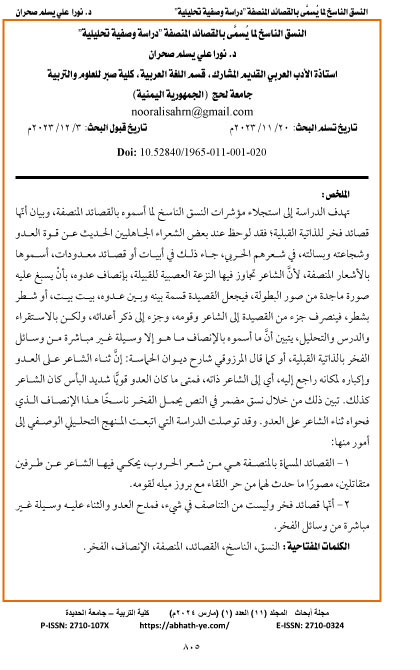(A Descriptive Analytical Study)
Keywords:
pattern, cancelling, poems, fair, equality, prideAbstract
This study aims to explain the indicators of the pattern of cancelling in what is called the "Fair Poems" and clarify that those poems are for tribal persona pride, as it was noticed in some of pre-Islamic poets the speech of the opponent strength, bravery and valor in war poetries. All of these come in some counted stanzas or poems that are called the "Fair Poems", because the poets avoided the inclination to his tribe by fairness to his enemy or opponent by complimenting his opponent as a hero. Thus, he makes his poems equally divided between him and his opponent, verse by verse or stanza by stanza, so that part of the poem is specified to the poet and his tribe and the other part is to mention his opponents. Nevertheless, by extrapolating, studying and analyzing, it is revealed that the "Fair Poems" are not but an indirect way of the ways of pride of tribal persona, or as Al-Marzouqi in explaining "Al-Hamasah" poem says: "in complimenting the poet to his opponent and elevating his rank is referred to the poet himself; so when the opponent is strong, so is the poet. This is revealed through an implied pattern in the text which has pride that is cancels the fairness that is contained in the poet complimenting his opponent.
This study, that adopted the descriptive and analytical approach, reached many points, among which are that:
- The poems that are called "Fair Poems" are from war poetries, in which the poet talks about two warriors members describing what happened to them of heated confronting, with the projection of his inclining to his tribe.
- They are pride poems and do not have equality or fairness at all, as complimenting or admiring the opponent is an indirect mean of pride techniques.

Downloads
Published
How to Cite
Issue
Section
License
Copyright (c) 2024 ِabhath Journal for the Humanities

This work is licensed under a Creative Commons Attribution 4.0 International License.
- البحوث المنشورة في المجلة مرخصة بموجب ترخيص (CC BY 4.0) Creative Commons Attribution 4.0 الدولي.
- تسمح المجلة بإعادة نسخ وتوزيع ونقل العمل لأي وسط أو شكل لأي غرض.
- تسمح بالتعديل والتحويل، والإضافة على العمل مع نسبة ذلك إلى المؤلف.
- حقوق النشر يحتفظ بها الباحثون.




